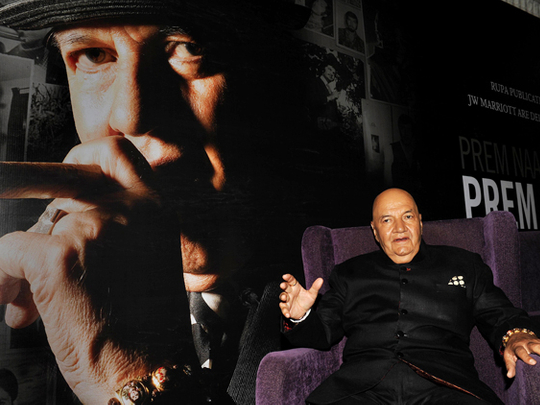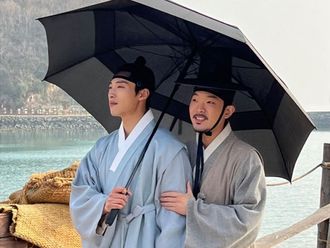
He never needed any special costumes or make-up. His trademark lascivious sneer and a menacing voice was all that was needed to establish him as a villain in the viewer’s mind.
But when Prem Chopra embarked on his film career, it was with the intention of becoming a hero. A director’s illness and a small role in a film that went on to become a hit changed his destiny.
He has worked with (and been beaten up by) by every Bollywood superstar — Manoj Kumar, Sunil Dutt, Dilip Kumar, Dev Anand, Rajendra Kumar, Shammi Kapoor, Dharmendra, Rajesh Khanna, Amitabh Bachchan, Jeetendra, Rajinikanth, Rishi Kapoor — for molesting Hema Malini, Nutan, Asha Parekh, Saira Bano, Sharmila Tagore, Dimple Kapadia, Rekha... to mention a few.
Later, shifting to more positive roles — and in line with his advanced years — he worked with the new generation, or many cases the second or even third generation of his former co-stars, including Bobby Deol, Abhishek Bachchan, Hrithik Roshan, Saif Ali Khan, Ranbir Kapoor, Kajol, both Karisma and Kareena Kapoor, Preity Zinta, Twinkle Khanna and Sonam Kapoor — a record unlikely to be surpassed.
But establishing himself in Bollywood was not easy.
Unsuccessful foray
As he recalls in this biography by his daughter Rakita Nanda, his desire to try his luck in films — when he was awaiting his graduation results in 1955 — failed to impress his parents and his foray to Bombay the same year was unsuccessful.
It was not until 1960 that he returned to Bombay and films, but on the advice of his father, he first searched for a job to sustain himself, eventually ending up as a supervisor in Times of India’s (a leading Indian newspaper) circulation department.
His first role as a hero was in Chaudhary Karnail Singh (1960) — a Punjabi film — and though some small roles came his way, a break was still far off. Legendary director Mehboob Khan offered him an important role in his next film but the project was delayed due to his illness.
Meanwhile, Chopra accepted a villain’s role in Manoj Kumar-starrer Woh Kaun Thi (1964) and its success sealed his fate.
After the film’s premiere, an angry Khan chided him for his impatience, predicting he would now be labelled a villain. Chopra met Filmistan studio chief Tolaram Jalan but his right-hand man Bakshi advised him that if he wanted to be a popular actor and make money, he should forget being a hero and continue as a villain.
Nuanced performances
Thus, an actor who invented and re-invented himself as a villain was born. He interpreted each role with subtle nuances.
The real-life Chopra is a far cry from his reel-life persona. All his colleagues testify to his warm and considerate nature, humour and professionalism. Also, his poetic skills led Dharmendra to dub him ‘Prem Awaargi’.
This is well brought out in the biography, based by Nanda on a series of interviews with her father and memories shared by various on-screen colleagues — old and new. She chose the first person device as the “best way to put his story across as if he was narrating it”.
A mix of chronological and thematic approaches, it gives a nuanced portrait of Chopra — both at work and home — the latter including the tough task of explaining to his daughters why he is evil onscreen and gets beaten up or even killed.
As a view of Bollywood over the years, the book makes for an absorbing and enthralling read.












